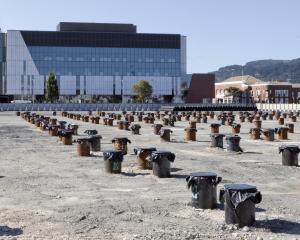
In May, the co-operative announced a capital raise from cash-strapped shareholders who would contribute to share capital by deductions from livestock proceeds. At the time, chairman Mark Wynne said the move had attracted some "very vocal" feedback.
The company believed funding in the range of $100 million to $150 million, which was indicative only, over the next few years might be required, however that would not be provided solely by the equity from farmer shareholders.
This week, Mr Wynne said Alliance was seeking to strengthen its balance sheet through the share deductions and delivery of other business initiatives.
Last year, it posted a $97.9m pre-tax loss, its worst financial result since 2012 when it posted its first operating loss in 20 years.
The rate of share deductions was set to balance maintaining livestock flows, raising capital and meeting the expectations of the company’s banking partners, he said.
“While there were mixed views about the level of deductions, we have heard concerns that the level of deductions are too high for some farmers in the current economic climate," he said.
The deduction rate for lamb and mutton would be halved from $4 per head to $2 per head, for beef it was from $48 to $24, and for venison from $16 to $8.
The deduction for cows was now at $12 and calves at $1 to reflect the lower value of the animal.
Alliance was appointing an investment bank to further explore capital raise options. That was a prudent decision given the company would not know the outcome of the farmer capital raise until next year.
“The engagement of an investment bank ensures our shareholders will have options should we need to use them. The options for Alliance remain the same; staying a co-operative, a hybrid model or a sale of the entire business. The final capital option for Alliance will be determined by our shareholders", he said.
Last month, Beef + Lamb New Zealand released its annual stock number survey which showed a notable decline in both sheep and cattle numbers as of June 30.
The country’s lamb crop this spring was expected to drop by nearly a million on last year, driven by drought in key sheep and beef regions, including Otago.
During a meeting with farmers near Waimate this week, Federated Farmers national meat and wool chairman Toby Williams said consolidation in the meat industry was "desperately" needed, while another farmer said too many people were making money out of the chain — and not the farmers.
Asked by the Otago Daily Times if the Meat Industry Association had any concerns about the amount of capacity versus stock numbers, chief executive Sirma Karapeeva said any decisions around processing capacity was up to individual companies.
Processing companies regularly reviewed their capacity to ensure it aligned with livestock volumes and they were experienced in managing variability and volatility, she said.
The meat processing sector remained concerned about the lack of limits on fossil fuel emitters offsetting their emissions by planting trees on productive land.
That risks pushing more land into carbon farming, which would have long-term consequences for the viability of meat processing plants, rural communities and the New Zealand economy. Meat processing plants were often the largest employers in the regions they operated, she said.
— Alliance Group signed two agreements in South Korea and Malaysia during Prime Minister Christopher Luxon's official trade delegation to South Korea and Malaysia.
The Memorandums of Understanding with South Korean distributor Daesang Corporation and Fatric in Malaysia laid the foundation for Alliance to expand its premium red meat portfolio in both countries, it said in a statement.
Alliance's Pukeuri processing plant, north of Oamaru, was one of only five New Zealand lamb plants licensed to supply Malaysia.















